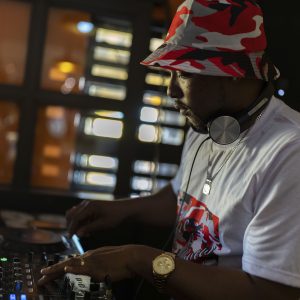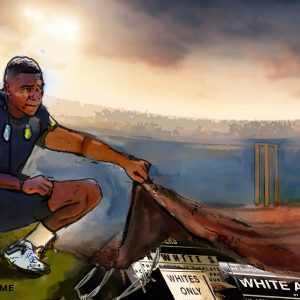Durban rapper Raheem Kemet is just getting started
The eclectic poet, beatboxer and performer unpacks his debut nine-track album ‘Living Forever’, recounting his unconventional journey and the importance of having faith.
Author:
9 June 2021

Rapper Raheem Kemet has been biding his time and honing his craft. “It was blood, sweat and tears with financial ups and downs, and I’d reached a point in my life [and career] where something just had to come out,” he says.
With a career spanning 16 years, and a background as a poet, beatboxer and frontman for Tree Houses On The Sea, it is almost inconceivable that he’s only releasing his first major album, Live Forever, in 2021.
“I was always told … don’t give them too much at the beginning,” he laughs. “Let people see what you’re about. This project is more like an intro.”
Kemet’s journey has not been linear. His breakthrough came with a live performance of his single The Fire on the internet platform Balcony TV. It caught the attention of Sony Music, which signed him on in 2017.

“I had been independent for quite some time before then and to get my music through [to] the mainstream and to get on to radio was a huge breakthrough,” he says.
Released in February this year, Kemet’s EP is part of the slow-and-steady approach he takes to his work. “I can hold my music forever, just so it comes out perfectly,” he says. “At any given time, if anyone at my label asks me for an album or an EP, I’m ready.” And when Sony Music asked, he was more than prepared.
Live Forever came together when the artist was in the studio with his business partner Luyanda Sosibo and DJ Grand Duke Raw listening to and selecting from a host of songs Kemet has worked on over the years – some, like the title track Live Forever, for as long as five years.
“I originally wrote it to a beatbox,” he says of the eponymous song. Kemet breaks out into a brief beatbox rendition of the song’s melody. “Most of my music starts from a beatbox when I’m writing a song from scratch. I then send a beatbox to some producers who can translate it. I also guide my live band with a beatbox.”
The album was worked on across different studios and territories, including South Korea in 2017, where the video for Who Knows was shot. Nothing about the EP was rushed. Kemet lets his work breathe and grow, leaving space to experiment and stretch himself sonically. He thrives on surprise and mystery.
A versatile artist
While 2020 was a struggle for him, Kemet focused on staying productive during the pandemic. “During that time, I was contacting a bunch of producers and recorded an album,” he says. Of the 13 songs he made during the early stages of lockdown, two made it on to the EP, Black History and Palm Trees.
“With Black History I didn’t want the message to die down about Black Lives Matter,” Kemet says. “The song needed to come out so the message could stay alive.” The track is about violence against Black people, including xenophobia on this continent, and features Kemet alongside Johannesburg rappers Melly-Mel and P-Kuttah and New York rapper Kesed the Younger.
Rhys Fataar, who produces under the name Syre, created the infectious beat. He also produced Palm Trees, a less intense arrangement in which Kemet sings, “You’ve got me chasing palm trees.” Kemet’s sound on the summer-soaked Palm Trees is ethereal compared to how hard and rapidly he flows on Black History. The first two songs on the EP, Go Deep and Remedy, were recorded in Joburg with artist Hugo Flash, who worked on the conventional but lively beats. Kemet flexes his lyrical muscles in both.
Related article:
What stands out across the EP is Kemet’s versatility. He can sing, spit as hard as your favourite old-school rapper and jump onto any instrumental. Whether it’s Afro-house on the Live Forever (uLuxolo remix), a hardcore boom-bap beat on Black History, more contemporary hip-hop on Go Deep and Remedy or pop on Palm Trees, he traverses musical landscapes with ease. “I draw inspiration from everything. It doesn’t matter what genre it is,” he says.
Kemet has received some backlash from people unable to pinpoint his sound but says he doesn’t want to be boxed in. “I am a reflection of my surroundings. I could be anywhere and be inspired … I see things, I draw from them, get inspired and it allows me to tap into my creativity.”
His musical influences are as diverse as his sound. He is inspired by artists who push sonic boundaries and grew up listening to icons such as Aretha Franklin, Michael Jackson, Tupac and Miles Davis. He also takes inspiration from New Kids on the Block, Yasiin Bey, Talib Kweli, Lauryn Hill, Sade, Rick Rubin and Quincy Jones.
Beyond all else, Kemet aspires to become an iconic African musician like the legendary Afrobeats king Fela Kuti. “Let’s take Burna Boy for example. If you tour the US, no one is on his wave. That’s where I want to get. I want to get to that Fela Kuti, Hugh Masekela-type phase where I evolve into this unique African imprint,” he says.
Shaped by place and faith
Kemet grew up in Durban. He moved around the city a lot because his mother is a teacher. The rapper has lived in Newlands West, Wentworth, Chatsworth and central North Beach. By spending time in different areas and cultural centres, he gained diverse experience.
“Moving and being around different types of people constantly definitely shaped me. I’ve seen both sides of the coin, poverty and opulence, and that gave me perspective as to who I am. Having knowledge of different sides of society really helped me to empathise with people and their situations and I try to communicate that through my art,” he says. “I’m an artist because it’s a gift I cannot ignore.”
Related podcast:
While Kemet doesn’t want to be defined by his religion or to be called a “Muslim rapper”, he recognises that Islam has influenced his career. “When making my music, I try to make sure it’s guided by the spirit, which is conscious music,” he says, though he is hesitant to use any labels to describe his sounds. Kemet’s religion and spirituality aid his creativity. He is constantly learning about himself and his work through Islam. “I try to make music that’s in line with my spiritual growth and where I am in life. It’s just a conversation with me.”
The performer understands that it is important to represent his faith in an industry where few rappers are open about their beliefs. He salutes the artists who aren’t afraid to be open, especially one of his favourites, Yasiin Bey. “There are plenty of American rappers who embrace Islam, but in South Africa I don’t know too many [other than Youngsta CPT],” he says.
Purpose and patience
With Live Forever, Kemet is starting the next phase of his career – and the album’s title gives listeners a window into his mindset. He wants to endure.
“There’s some wisdom I’ve gained behind trusting the process,” he says, “and in this journey, I’ve developed a backbone on top of [a] backbone. I’ve gone through the setbacks and the waiting and trying to figure out how I’m going to eat.

“There were many times where I could have said, ‘Fuck this, I’m just going to stop music. I’m never releasing.’ But I had to be patient.
“People have been like, ‘Yo, Raheem, you’ve been in this game, what makes you hold on?’” he says. “Faith. Faith, man. That makes me hold on. I believe I was put on this Earth for a certain purpose and the only time I’m meant to go is when that purpose is fulfilled, and it doesn’t matter how long it takes to get there.”


